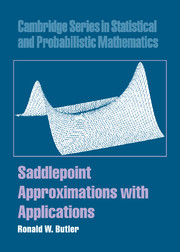Book contents
- Frontmatter
- Contents
- Preface
- 1 Fundamental approximations
- 2 Properties and derivations
- 3 Multivariate densities
- 4 Conditional densities and distribution functions
- 5 Exponential families and tilted distributions
- 6 Further exponential family examples and theory
- 7 Probability computation with p*
- 8 Probabilities with r*-type approximations
- 9 Nuisance parameters
- 10 Sequential saddlepoint applications
- 11 Applications to multivariate testing
- 12 Ratios and roots of estimating equations
- 13 First passage and time to event distributions
- 14 Bootstrapping in the transform domain
- 15 Bayesian applications
- 16 Nonnormal bases
- References
- Index
16 - Nonnormal bases
Published online by Cambridge University Press: 25 February 2010
- Frontmatter
- Contents
- Preface
- 1 Fundamental approximations
- 2 Properties and derivations
- 3 Multivariate densities
- 4 Conditional densities and distribution functions
- 5 Exponential families and tilted distributions
- 6 Further exponential family examples and theory
- 7 Probability computation with p*
- 8 Probabilities with r*-type approximations
- 9 Nuisance parameters
- 10 Sequential saddlepoint applications
- 11 Applications to multivariate testing
- 12 Ratios and roots of estimating equations
- 13 First passage and time to event distributions
- 14 Bootstrapping in the transform domain
- 15 Bayesian applications
- 16 Nonnormal bases
- References
- Index
Summary
Up to now, all of the saddlepoint formulas have involved the univariate normal density function ø(z) and its CDF Φ(z). These expressions are called normal-based saddlepoint approximations and, for the most part, they serve the majority of needs in a wide range of applications. In some specialized settings however, greater accuracy may be achieved by using saddlepoint approximations developed around the idea of using a different distributional base than the standard normal.
This chapter presents saddlepoint approximations that are based on distributions other than the standard normal distribution. Suppose this base distribution has density function λ(z) and CDF Λ(z) and define the saddlepoint approximations that use this distribution as (λ, Λ)-based saddlepoint approximations. Derivations and properties of such approximations are presented in section 16.1 along with some simple examples. Most of the development below is based on Wood et al. (1993).
Most prominent among the base distributions is the inverse Gaussian distribution. The importance of this base is that it provides very accurate probability approximations for certain heavy-tailed distributions in settings for which the usual normal-based saddlepoint approximations are not accurate. These distributions include various first passage times in random walks and queues in which the system is either unstable, so the first passage distribution may be defective, or stable and close to the border of stability. Examples include the first return distribution to state 0 in a random walk that is null persistent or close to being so in both discrete and continuous time. A second example considers a predictive Bayesian analysis for a Markov queue with infinite buffer capacity.
Information
- Type
- Chapter
- Information
- Saddlepoint Approximations with Applications , pp. 528 - 547Publisher: Cambridge University PressPrint publication year: 2007
